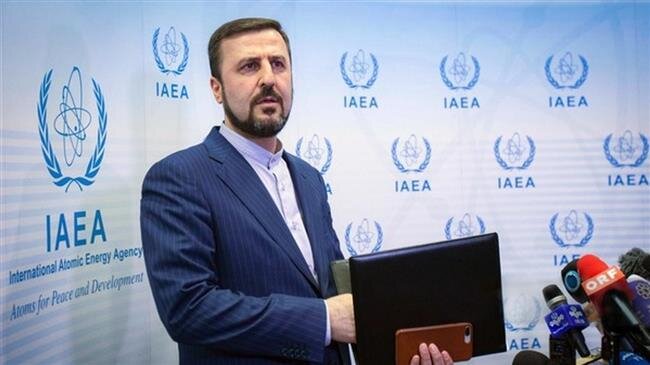Iran warns against resolution at IAEA Board meeting

TEHRAN – Iran has responded defiantly to critical reports by the UN nuclear watchdog, urging the UN body to act impartially amid ongoing uncertainty over when the nuclear talks between Tehran and world powers would resume.
Iran's representative to the international organizations in Vienna Kazem Gharibabadi said all of Iran’s nuclear activities, including high-enriched uranium and production of metal uranium, are in line with Iran’s proliferation commitments and that no one is entitled to ask Iran to halt its nuclear activities.
“Since the other parties to the JCPOA (the 2015 nuclear deal) have not fulfilled their obligations in lifting sanctions and the U.S. policy of imposing illegal and unilateral sanctions on Tehran still goes on, no one can pressure Iran to halt its nuclear activities,” the Iranian diplomat said.
The remarks came after Western news outlets published the details of two reports by the International Atomic Energy Agency (IAEA) accusing Iran of stonewalling an investigation into past activities and jeopardizing important monitoring work.
The IAEA said in two reports to member states reviewed by Reuters that there had been no progress on two central issues: explaining alleged uranium traces found at several old, undeclared sites and getting urgent access to some monitoring equipment so that the agency can continue to keep track of parts of Iran's nuclear program.
Citing diplomats, Reuters claimed that the IAEA urgently needs access to the equipment to swap out memory cards so there are no gaps in its observation of activities like the production of parts for centrifuges, machines that enrich uranium.
“The Agency's confidence that it can maintain continuity of knowledge is declining over time and has now significantly further declined,” one of the two reports said, adding that while the agency needs to access the equipment every three months, it had not had access since May 25.
“This confidence will continue to decline unless the situation is immediately rectified by Iran,” the IAEA claimed.
The Reuters report also suggested that the United States and its European allies could push for a resolution at next week’s meeting of the 35-nation IAEA Board of Governors pressuring Iran to yield.
But Iran has already warned about such a move, considering it as an obstacle to resuming the stalled Vienna talks over reviving the JCPOA.
In his Wednesday phone conversation with President of the European Council Charles Michel, Iranian President Ayatollah Seyed Ebrahim Raisi signaled that any non-constructive move at the IAEA would undermine the prospect of resuming the Vienna talks.
“The serious cooperation of the Islamic Republic of Iran with the IAEA is a clear example of Iran's will for transparency in its nuclear activities. It is natural that in the case of a non-constructive treatment in the International Atomic Energy Agency, it is unreasonable to expect Iran to have a constructive response. Non-constructive actions naturally disrupt the negotiation process as well,” Ayatollah Raisi said.
Earlier on Monday, Iranian Foreign Ministry spokesman Saeed Khatibzadeh had issued a stark warning to Washington and its European allies over the likelihood of pushing for a resolution against Iran at the next meeting of the IAEA Board of Governors.
“The next meeting of the Board of Governors is a usual meeting. So, no parties should make miscalculations that would impinge on the Vienna negotiations,” Khatibzadeh said during a press briefing. “The relations between Iran and the IAEA are technical and respectful, and within the same framework, a deep and correct understanding is established between the two sides. We hope that the other parties will not interfere in this regard.”
In addition to third parties, there are concerns that the IAEA would submit to political pressure from outside the UN body. This may have prompted Gharibabadi to urge the IAEA to keep its impartiality.
The Iranian diplomat accused the IAEA of falling under the influence of some of its certain members. “The Agency must maintain its independence, impartiality, and professionalism, and the members of the Agency must seriously refrain from putting pressure on the Agency and trying to use it as a tool for their own political purposes,” Gharibabadi said.
He rejected the sense of urgency articulated in the IAEA reports, underlining that what is a cause for concern is Israel’s nuclear weapons and acts of sabotage against Iranian nuclear facilities as well as the assassination of Iranian nuclear scientists which the IAEA did nothing to address.
“We have a transparent constructive cooperation and interaction with the Agency, and this transparency should be recognized and appreciated, not be used as a means to make gratuitous excuses, because this unnecessary crisis-making approach will first backfire on the Agency,” Gharibabadi warned.
Leave a Comment